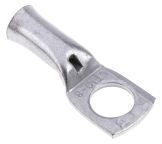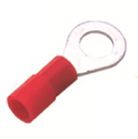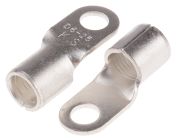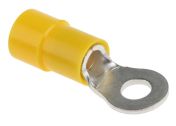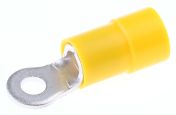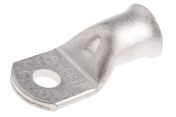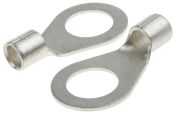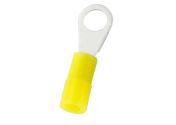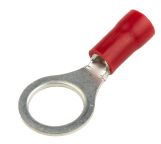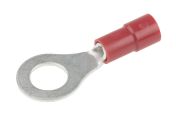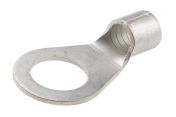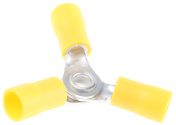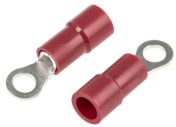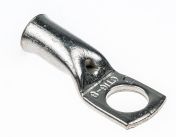Ring Terminals
A ring terminal, also known as a ring lug or cable lug ring, is a type of electrical connector designed to securely terminate stranded wires to studs, bolts, or screw terminals. It consists of a short metal tube, or barrel, where the wire is inserted and crimped, and a flat ring with a central hole that attaches to the connection point. Ring terminals are available in both insulated and non-insulated varieties, catering to different electrical and environmental requirements.
What Does a Ring Terminal Do?
A ring terminal creates a reliable, solderless electrical connection. By crimping the stranded wire within its tube, it establishes a strong mechanical and electrical bond. The flat ring end then connects firmly to screws or studs, ensuring a secure and conductive pathway for electricity. This design prevents accidental disconnection and maintains consistent electrical contact even in environments subject to vibration or movement.
Where Are Ring Terminals Used?
Ring terminals are indispensable components in various electrical and electronic applications where secure, durable, and vibration-resistant connections are paramount. They are widely used in:
- Electrical panels and switchboards
- Terminal blocks and distribution boards
- Wiring harnesses in automotive and industrial machinery
- Battery connections and grounding points
- Control cabinets and instrumentation
Their versatility makes them suitable across residential, commercial, and industrial sectors.
Types of Ring Terminal
Ring terminals come in a broad range of sizes and specifications to match various wire gauges and stud diameters. Selecting the correct size ensures safe current flow and mechanical stability.
- Wire Size (Cross-Sectional Area or AWG): The barrel of the terminal must fit the wire gauge precisely to enable a strong crimp and prevent overheating.
- Ring Size: The diameter of the ring hole corresponds to the bolt or stud size, typically specified in metric units (e.g., M4, M6).
Insulated Terminals
Insulated ring terminals are easily identifiable by their colour-coded plastic sleeves that provide electrical insulation and protect against accidental shorts. The most widely used colour coding follows the DIN 46237 standard. This colour coding denotes the wire size, simplifying selection and ensuring proper application. For example:
- Red: For wires ranging from 0.5 mm² to 1.5 mm².
- Blue: For wires ranging from 1.5 mm² to 2.5 mm².
- Yellow: For wires ranging from 2.5 mm² to 6 mm².
Other colours are also available for different wire sizes. The insulation also offers environmental protection against moisture, dust, and abrasion.
Non-Insulated Terminals
Non-insulated ring terminals are generally larger than their insulated counterparts, designed for heavy-duty applications requiring larger wire sizes and stud diameters. These terminal ring plugs are commonly used in high-current or high-temperature environments. Because they lack insulation, they often require additional protective measures such as heat shrink tubing or electrical tape after installation. Crimping non-insulated terminals usually requires specialised tools to ensure a secure connection.
Choosing the Right Size and Type
Selecting the correct ring terminal for your application is essential for creating reliable and safe electrical connections. Here’s what you should consider:
- Wire Gauge Compatibility: It's crucial to match the terminal lug's barrel size to the wire gauge (AWG or mm²) you are using. An improper match can lead to a weak crimp or potential overheating.
- Stud Size Matching: Select the correct ring diameter to precisely fit the bolt or stud to which the terminal will be attached. A proper fit ensures maximum contact area and a secure connection.
- Insulated vs. Non-Insulated: Choose an insulated ring terminal for enhanced safety, especially in exposed environments where protection against accidental contact or shorting is needed. Non-insulated ring terminals are often preferred for high-temperature applications or when a ground connection is required, though they may need separate insulation.
- Material Type: Consider options like copper, brass, or tinned finishes. Copper offers excellent conductivity, while tinned finishes provide enhanced corrosion resistance, relevant for environments with moisture or chemicals.
- Application-Specific Types: For specialised needs, consider specific ring terminal types such as heat-shrinkable terminals for environmental sealing, high-temperature terminals, or heavy-duty versions for demanding industrial loads.
Advantages of Using Ring Terminals
Ring terminals offer several compelling advantages that make them a preferred choice for creating secure and reliable electrical connections.
- Secure Connection: The closed-loop design of a ring terminal inherently prevents accidental disconnects from a stud or bolt, even under vibration or tension. Once fastened, the connection remains in place.
- Vibration Resistance: This inherent security makes ring terminals ideal for applications subject to constant vibration, such as in automotive, aerospace, and heavy machinery, where other terminal types might loosen over time.
- Durability: When crimped properly, ring terminals form long-lasting mechanical and electrical bonds. They are built to withstand harsh conditions, contributing to the overall durability of electrical connections.
- Versatility: Ring terminals are highly versatile, compatible with a wide range of wire types and electrical systems. Their adaptability makes them suitable for numerous applications, from simple household wiring to complex industrial installations.
- Ease of Use: Despite their robust performance, ring terminals are relatively simple to install. Using common crimping tools, even a solderless ring terminal, allows for quick and efficient creation of strong electrical bonds.
Industrial Application of Ring Terminal
Ring terminals are fundamental components across numerous industrial sectors:
- Automotive: Ring terminals are extensively used in vehicle wiring harnesses, battery connections, and various electrical systems due to their excellent vibration resistance and secure fastening.
- Manufacturing and Machinery: They are critical for wiring control panels, motors, and industrial machinery, ensuring stable power distribution and reliable signal connections. The closed-loop design prevents disconnections in vibrating environments.
- Aerospace and Defence: In aerospace and defence applications, where reliability is paramount, ring terminals provide secure and durable electrical connections in aircraft, vehicles, and communication systems.
- Telecommunications: Ring terminals are employed in telecommunication equipment for power distribution and grounding, ensuring stable and interference-free connections.
- Renewable Energy: In solar panel installations and wind turbines, ring terminals are used for secure connections in power generation and distribution circuits, offering durability in outdoor conditions.
- Marine and RV: Ring terminals are ideal for marine and RV electrical systems due to their secure connection and availability of corrosion-resistant materials like tinned copper, crucial in wet or humid environments.
Trusted Ring Terminal Manufacturer, Supplier & Distributor in Malaysia
RS is your trusted source for ring terminals in Malaysia. As a leading manufacturer, supplier, and distributor, we offer a wide selection of high-quality ring lugs, including insulated ring terminals, non-insulated ring terminals, and cable lug rings, from top brands like TE Connectivity, JST, and RS PRO.
Looking for a reliable ring terminal crimp or solderless ring terminal for your electrical connections? Buy your terminal lug connector online from RS, along with other components like bootlace ferrules and wire housings. We offer competitive prices and a seamless online ordering experience. Enjoy fast, nationwide doorstep delivery. For detailed delivery information and fees, visit our Delivery page.
Popular Searches
Related links
- RS PRO Insulated Ring Terminal 4mm² to 6mm² Wire Size, Yellow
- RS PRO Insulated Ring Terminal 2.5mm² to 6mm² Wire Size, Yellow
- Ring cable lug/blank 4.3mm 1.5-2.5mm² PU
- Ring cable lug/blank 6.4mm
- Ring cable lug Red 3.2mm PU=Pack of 100
- RS PRO Insulated Ring Terminal 1.5mm² to 2.5mm² Wire Size, Blue
- Phoenix Contact Cable Lug
- Ring cable lug/blank 6.5mm 4-6mm
